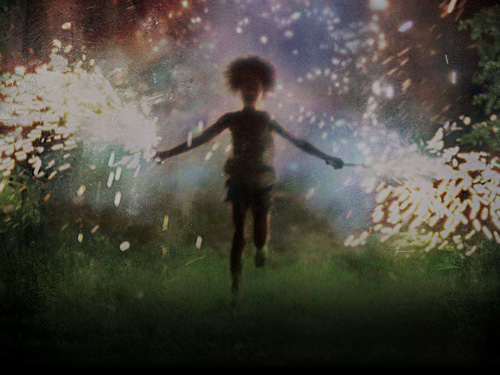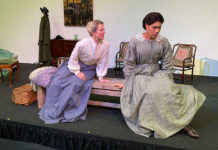In the fairy tales of old, peasants survive in squalor while palaces glitter in the distance; magic is wielded when heroes evolve from unlikely origins; a mercurial Mother Nature is both friend and enemy, and mysterious deadly beasts travel the land.
All of the above is true in a truly original film called “Beasts of the Southern Wild.” The squalor is a coastal Louisiana backwater called The Bathtub where an island pleasure palace flashes its lights offshore. The magical hero growing up in this singular place, is a wide-eyed six-year-old named Hushpuppy (Quevenzhane Wallis), who lives alone with her father Wink (Dwight Henry), in a couple of ramshackle trailers. Nature has provided food and shelter for Bathtub’s residents for decades, but Hurricane Katrina’s deadly fury is bearing down on them. And the dangerous beasts include not only the normal poisonous snakes and man-eating alligators, but also some huge prehistoric monsters called aurochs.
Hushpuppy narrates the film in such a way that we hear her inner thoughts—and the thoughts of a six-year-old are often wild and mysterious. Lets take, for example, the aurochs. Hushpuppy’s teacher introduced her to these recently extinct ancestors of modern-day cattle, and the youngster is convinced that the coming storm will somehow release the long-horned beasts from their frozen, underground imprisonment to once again walk the Earth. In fact, much of Hushpuppy’s world may (or may not) be a dream. In addition to the aurochs, there is the ancient fisherman who pilots his boat to a floating island where a mother-like woman resides. But this island, boat, fisherman, and Madonna cook (and the dynamite-filled alligator), may all be will-of-the-wisps.
Director Benh Zeitlin and co-screenwriter Lucy Albar have created a magical movie without any of the whiz-bang gimmicks wasted in many recent big-budget films. No CG here. Bathtub’s rotting, fetid, ramshackle dwellings are jumbled together out of salvaged lumber, sheet metal, and pieces of automobiles and appliances, and are crammed with rusty, dirt-encrusted cast offs that look like they were claimed at low tide. The residents are even scruffier. Shampoo and toothpaste don’t seem to exist here, beer and moonshine makes men, women and children sleep where they fall down, while animals sleep, eat and defecate over, under and inside the houses.
One of Hushpuppy’s neighbors warns her that the Government (with a capital G) will use the impending hurricane as an excuse to force everyone into shelters and destroy the community they love so well. “Well, I ain’t leavin’,” Wink exclaims with proud certainty. He uses the same bravado to swear aloud that he will be there to protect his daughter from whatever may happen, but “just in case I don’t come back, Walrus (Lowell Landes) will be your dad.”
Being a single father doesn’t come easy to Wink. Most of the time, Hushpuppy is a millstone around his neck—slowing him down and preventing him from acting even rowdier than he does. He has banished his daughter to live with a pet dog and dozens of chickens in her own trailer precariously perched high in the air on stacks of cinder blocks. When Wink disappears for several days, Hushpuppy is forced to take care of herself. He returns wearing a hospital gown and ID bracelet and immediately goes to his bed. So when the big pot of canned cat food Hushpuppy left heating on the stove explodes and sets her trailer aflame, the six-year- old seeks safety inside an upturned paper box where she draws pictures on the cardboard so school children in the future will remember her.
The film works because of the naturalness of Quevenzhane Wallis’ exceptional work. This young girl is a force of nature herself—smart, sassy and wise beyond her years, the audience wants to protect her, watch her blossom, and delight in her success. I grew to love and respect this amazing girl, and I hope you will too.
Comments? E-mail gi*********@co*****.net.
78.6
F
Healdsburg
April 14, 2025








